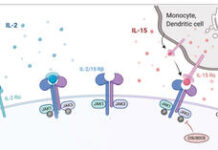On 9 February 2023, the US Food and Drug Administration (FDA) approved dostarlimab-gxly (Jemperli, GlaxoSmithKline LLC) for adult patients with mismatch repair deficient (dMMR) recurrent or advanced endometrial cancer, as determined by an FDA-approved test, that has progressed on or following a prior platinum-containing regimen in any setting and are not candidates for curative surgery or radiation.
In April 2021, dostarlimab-gxly received accelerated approval for adult patients with dMMR recurrent or advanced endometrial cancer, as determined by an FDA-approved test, that has progressed on or following a prior platinum-containing regimen.
Full prescribing information for Jemperli is available here.
Efficacy for the regular approval was evaluated in GARNET (NCT02715284), a multicentre, multicohort, open-label study conducted in patients with advanced solid tumours. The efficacy population consisted of a cohort of 141 patients with dMMR recurrent or advanced endometrial cancer who had progressed on or after a platinum-containing regimen. Patients treated with prior PD1/PD-LI-blocking antibodies, other immune checkpoint inhibitors, or had autoimmune diseases requiring systemic immunosuppressant agents within 2 years were excluded.
The major efficacy outcome measures were overall response rate (ORR) and duration of response (DoR) as assessed by blinded independent central review according to RECIST v1.1. Confirmed ORR was 45.4% (95% confidence interval 37.0, 54.0), with a 15.6% complete response rate and a 29.8% partial response rate. Median DoR was not reached, with 85.9% of patients having durations ≥12 months and 54.7% of patients having durations ≥24 months (range, 1.2+, 52.8+).
The most common adverse reactions (≥20%) were fatigue/asthenia, anaemia, rash, nausea, diarrhoea, constipation, and vomiting. Immune-mediated adverse reactions can occur including pneumonitis, colitis, hepatitis, endocrinopathies, nephritis with renal dysfunction, and skin adverse reactions.
The recommended dostarlimab-gxly dose and schedule (doses 1 through 4) is 500 mg every 3 weeks. Subsequent dosing, beginning 3 weeks after dose 4, is 1,000 mg every 6 weeks until disease progression or unacceptable toxicity. Dostarlimab-gxly should be administered as an intravenous infusion over 30 minutes.
This review used the Assessment Aid, a voluntary submission from the applicant to facilitate the FDA’s assessment. The FDA approved this application 1 month ahead of the FDA goal date.
Healthcare professionals should report all serious adverse events suspected to be associated with the use of any medicine and device to FDA’s MedWatch Reporting System.
For assistance with single-patient INDs for investigational oncology products, healthcare professionals may contact FDA’s Oncology Center of Excellence Project Facilitate.









